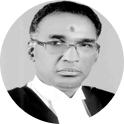Jasti Chelameswar

Jasti Chelameswar
Former Judge of the Supreme Court of India
Assumed Office10th Oct, 2011
Retired On22nd Jun, 2018
Previously
Chief Justice of the Kerala High CourtMarch 17th 2010 - October 9th 2011
Chief Justice of the Guwahati High CourtMay 5th 2007-March 16th 2010
Judge of the Andhra Pradesh High CourtJune 23rd 1997-May 4th 2007
Profile
Justice Jasti Chelameswar graduated with a Bachelors in Physics from Madras Loyola College and Bachelor in Law from Andhra University, Visakhapatnam in 1976. He was enrolled as an Advocate with the High Court of Andhra Pradesh and practised under Senior Advocates Dr B. Bhimaraju, Mr P. Rajarao, and Mr K. Srinivasa Murthy. He was the Standing Counsel for the Andhra Pradesh Lokayukta in 1985 and 1986. He also worked as a Government Pleader in the High Court of Andhra Pradesh in the years 1988 and 1989. In 1995, he was designated as a Senior Counsel and appointed as Additional Advocate General.
Notable Judgments
He gave the dissenting opinion in Supreme Court Advocates on Record Association v Union of India, which held the National Judicial Appointments Commission (NJAC) unconstitutional. Justice Chelameswar is known for pointing out discrepancies in the functioning of the collegiums, stating that the system has become ‘a euphemism for nepotism where mediocrity or even less is promoted and a constitutional disorder does not look distant.’ He has openly criticised the proceedings of the collegiums stating that they are opaque and inaccessible to the public, with judges being selected on personal requests. According to him, the NJAC was much-needed reform to address myriads of problems plaguing the Indian judiciary, including spiralling arrears and the inability to fill up vacancies. His decision to opt-out of the collegium is proof of his aversion towards the current collegium system.
He was a part of the division bench of the Supreme Court which held Section 66A of the Information Technology Act 2000 as unconstitutional as being arbitrary, and excessively and disproportionately invades the right of free speech and expression.
He was a part of the bench, with Justice Sapre that upheld the validity of the Haryana Panchayati Raj (Amendment) Act, 2015, which introduced the minimum educational qualification for candidates to contest the panchayat elections.
He is a part of the bench of the Supreme Court that has clarified that no Indian citizen without an Aadhaar card can be deprived of basic services and government subsidies.
